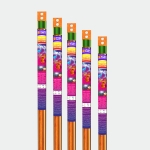SURYA POWER INDUSTRIES GI EARTHING ELECTRODE
Surya Power GI (Galvanized Iron) earthing electrodes are commonly used for grounding electrical systems. These electrodes help in safely discharging excess electrical charges into the earth, which protects the equipment and prevents hazards like electric shocks or fire. The GI earthing electrode is part of the grounding system that ensures electrical installations remain safe and operational.
Key Features and Description:
- Material:
- Galvanized Iron (GI): These electrodes are made of high-quality galvanized iron. The galvanization process (coating the iron with zinc) protects the electrode from corrosion and enhances its lifespan, even when exposed to soil or moisture over long periods.
- Shape & Size:
- Rod Shape: The GI earthing electrode is typically in the form of a long, cylindrical rod or pipe.
- Size Options: These rods can range in diameter from 25 mm to 50 mm and can be several meters long (usually 2 meters to 3 meters), depending on the soil conditions and specific installation requirements.
- Electrode Design:
- Solid Rod Construction: The electrode is solid, which ensures continuous contact with the earth to provide effective grounding.
- Punched Holes or Slots: Some electrodes feature punched holes along the length to improve the surface area for better conductivity.
- Corrosion Resistance:
- The GI coating protects the iron from corrosion due to soil conditions (whether acidic, alkaline, or wet), ensuring a long-lasting and reliable grounding system.
- Installation:
- The electrode is driven vertically into the ground or buried horizontally, depending on the site-specific design requirements.
- It is connected to the grounding wire of the electrical system to complete the earthing process.
- Conductivity:
- The GI material provides excellent electrical conductivity, allowing it to efficiently carry excess electrical charges from electrical systems to the earth, preventing damage or accidents.
- Standards Compliance:
- Surya Power GI earthing electrodes are designed to meet various safety standards, including those set by national and international electrical codes, ensuring the protection of the electrical systems and individuals.
- Durability:
- These electrodes are known for their durability in all environmental conditions, making them ideal for use in residential, commercial, and industrial electrical systems.
Applications:
- Residential and Commercial Buildings: Used in earthing systems of homes, offices, and industrial premises.
- Power Substations and Distribution Networks: Ensuring the safety of electrical equipment and personnel.
- Solar Power Systems: Often used for grounding the electrical parts of solar power plants, helping to ensure safe operation.
Advantages of GI Earthing Electrodes:
- Cost-Effective: GI is relatively cheaper compared to other materials like copper.
- Corrosion Resistance: The galvanized iron coating ensures a longer lifespan.
- Safety: Proper earthing minimizes the risk of electric shock, equipment damage, and fire hazards.
SECOND DETAILS
GI CHEMICAL EARTHING ELECTRODE
GI Chemical Earthing Electrodes are grounding components used in electrical systems to safely dissipate fault or leakage currents into the ground, protecting both equipment and human life. Here's a detailed overview:
???? What Are GI Chemical Earthing Electrodes?
- GI stands for Galvanized Iron, which means the electrode is made from iron and coated with zinc to resist corrosion.
- Chemical earthing refers to the use of chemical compounds (like bentonite, salt, and charcoal) around the electrode to lower and stabilize the soil resistance.
- These electrodes are commonly used in areas with high soil resistivity or poor soil conductivity.
???? Construction
Typical GI Chemical Earthing Electrodes include:
- A galvanized iron pipe (with various lengths and diameters, e.g., 48 mm to 100 mm dia and 1 to 3 meters long).
- Multiple holes in the pipe to allow uniform distribution of moisture and chemicals into the surrounding soil.
- Inner conductor (sometimes a strip or solid bar) for enhanced conductivity.
- Surrounded by a backfill compound like bentonite or graphite-based mix to retain moisture and reduce resistance.
?? Features & Benefits
|
Feature
|
Benefit
|
|
Galvanized coating
|
Corrosion resistance and longer life
|
|
Low soil resistance
|
Better fault current dissipation
|
|
Easy installation
|
Reduces time and labor
|
|
Stable performance
|
Reliable even in dry or rocky soil conditions
|
|
Maintenance-free
|
Once installed, usually needs no upkeep
|
???? Typical Chemical Backfill Composition
- Bentonite Clay: Retains moisture, swells when wet
- Charcoal Dust: Improves conductivity
- Salt: Maintains moisture content and conductivity
- Some advanced variants use conductive compounds that don't leach into the soil.
???? Common Sizes
|
Pipe Diameter
|
Length
|
GI Thickness
|
Usage
|
|
48 mm
|
1.5 m – 3 m
|
3.2 mm
|
Light duty, residential
|
|
58 mm
|
2 m – 3 m
|
3.2 mm – 4 mm
|
Industrial, commercial
|
|
76 mm & 100 mm
|
3 m
|
4 mm+
|
Heavy-duty, substations
|
????? Applications
- Electrical panels
- Transformers
- Data centers
- Telecom towers
- Lightning protection systems
- Industrial and commercial buildings
???? Standards
Make sure the GI Chemical Earthing Electrodes conform to:
- IS 3043: Code of practice for earthing
- IEC/IEEE Standards depending on location and usage
